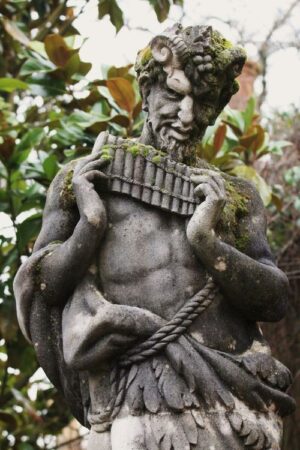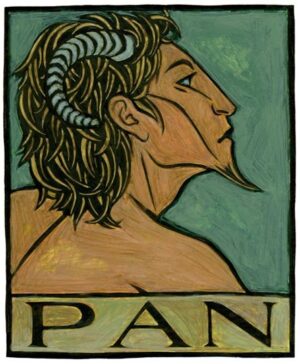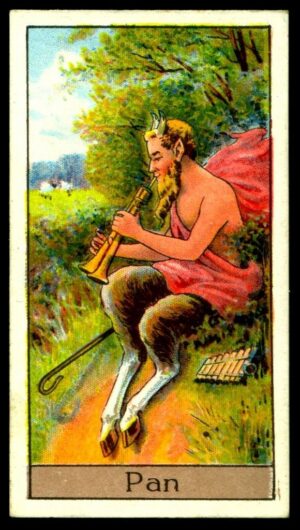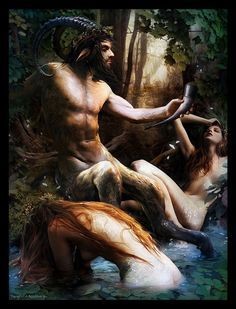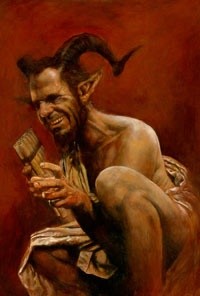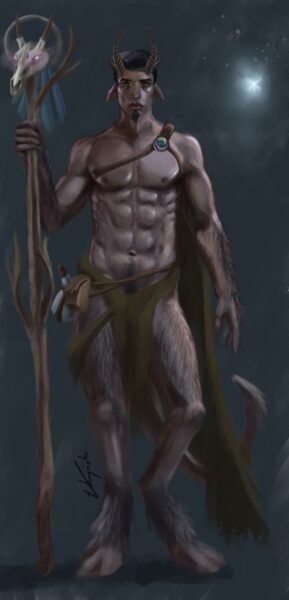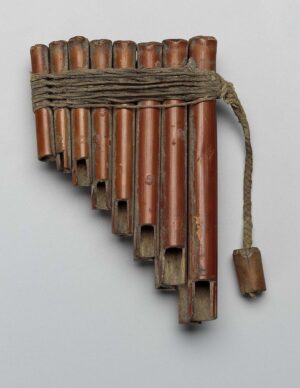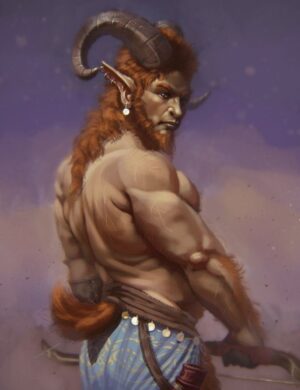Today we’re discussing the ancient Greek god Pan, signs this god wants to work with you, and what you can learn from the great god of the wild.
A vast pantheon of gods, both important and small, ruled over human affairs and played out their own mythic plays in Ancient Greek civilization. Pan was one among them, and he was in charge of the wilderness and grazing fields. We often see his image in books or paintings. Even though Pan isn’t one of the great Greek gods, references to him are more common than references to any other character in Greek mythology.
However, Pan, or Faunus as the Romans named him, wasn’t a typical Greek god. He was a bit wilder than the Olympian gods, who stood for the city’s noble aspirations, and his energy is therefore a bit different.
Pan, the Greek deity of the countryside, shepherds, and mountainsides, presided over a more rural and natural aspect of Greek culture than did the cosmopolitan Olympic deities.
But where did Pan originate from, and why do we hold him in such high regard? What modern-day mysteries does Pan contribute to? Continue reading to learn more about the goat-legged god including his myths, legends, and how to work with Pan.
The Greek God Pan In History & Myth
The popular origin story of Pan is that Hermes and Dryope, a tree nymph, bore Pan as their child. Pan lived in Arcadia, a region of Greece famous for its natural beauty as well as its danger. Even in modern times, the region of Arcadia in the middle of the Peloponnese remains rural and has a sparse population.
The word Pan is from a Greek prefix that means “all,” and it is possible that Pan was once a far more powerful and all-encompassing figure in Greek mythology. In some of the less common myths, he had the powers of a sea god and had the epithet Haliplanktos. He was also a god of oracles and a healer of epidemics through the cures that are revealed in dreams, thus his contribution to the modern-day work (pan + demic).
Some of these characteristics, like his status as a sea god, even baffled Classical Greek writers, because they don’t quite fit with the Classical system of gods. This suggests once more that the tradition surrounding Pan’s ancestry is so ancient that people forget about it by the time of the Classical Greeks.
The Location of Pan
The wild and rustic Arcadia, which is in the middle of the Peloponnese, was the birthplace as well as the primary place of adoration for the god Pan.
According to myth, Pan spent the majority of his time in this location meandering through the woods, playing eerie songs on his pipes, pursuing nymphs, and dozing off in quiet areas during the heat of the midday sun.
Among the pantheon of Greek deities, Pan is quite ancient. His name suggests that he belongs in the great outdoors, therefore you may expect to see him in places like forests and meadows.
It was in the countryside, far from any major cities, that Pan worship first took root. That’s why he didn’t get any massive temples in his honor. Instead, natural settings like caverns and grottos were at the heart of Pan worship.
He was the king of country singers, hunters, and shepherds. The people of Arcadia considered him a deity more than any other region. Pan was also often in the company of forest nymphs and gods.
Pan and Music
In most Pan myths, the (often unnamed) goddess of the woods rejects Pan’s advances and either transforms into an inanimate object or runs away from him because of his unattractive appearance.
Syrinx, a stunning wood nymph, is the protagonist of one tale. To avoid being discovered by Pan, she runs away and the goddesses transform her into a river reed. The reeds provide a sweet melody when the wind blows through them. Since he cannot tell which reed belongs to Syrinx, he must utilize a combination of reeds from the bunch to construct the pan flute. The ancient depiction of Pan frequently includes this instrument.
Pan later became one of the gods of music, often known for haunting woodland music in particular rather than jovial city-related tunes.
The Nymphs and Pan
Syrinx wasn’t the only nymph Pan had his eyes on; Pan chased many a nymph in mythology, as most Greek gods. However, he rarely received any affection in return.
Pitys was another nymph who rejected Pan’s advances in favor of a transformation into a plant, this time a pine tree. In fact, Echo was so head over heels for Narcisse that she ignored the pastoral god’s attempts to woo her.
Still, Pan did accomplish one impressive conquest. He enticed the moon goddess Selene into the woods while she was driving her silver chariot through the night by dressing up as a sheep.
The Word “Panic” Came from Pan
The name Pan is thought to have been the inspiration for the word “panic.” His threatening tone, typically depicted as a yell or shriek, struck fear into the hearts of those who had the misfortune to come across him.
There is an old story of a battle on Mount Olympus between a band of giants and the gods who lived there. Legend has it that Pan’s yell was so intimidating that when the Giants heard it, they lost their minds and ran away. As a result, the gods gain an advantage in their eventual victory.
Pan in Modern Times
Pan has come to represent the unstoppable power of nature throughout the ages. During the 1800s, there was a resurgence in interest in this mythological figure. Villages across the country held festivals with Pan as the primary focus. His exploits were the subject of countless legendary tales, and he is still considered to be a character that embodies the age-old mystique of the forest, as well as the spirit hunting and wildlife in general.
Pan, like the other gods of Ancient Greece, takes on many of the characteristics of the world that he ruled over. These characteristics include fertility and abundance. The fact that he is shown to be active and even frightening at times, together with having a wild, uncontrolled creative power, makes him a character that is engaging and quite representative of the wild nature all around us.
Pan’s Appearance:
Pan did not look like a typical Greek god, possibly because of his affinity for the outdoors and wild animals.
His human upper half is joined to a goatish lower half and horns. Additionally, Pan is said to sometimes appear as an elderly satyr with piercing blue eyes and a pointed beard. His wavy, white hair is powdered with gray, and the goat fur on his legs looks like snow. His massive, curving horns are a shiny brown color. He has a contagious chuckle that fills the cavern with joy, like the “first air of April.”
Like any god, Pan most likely has the power of shapeshifting, so he only appears elderly when his image is meant to impart the aura of wisdom.
Otherwise, the Greek god Pan can appear as a satyr or a young man covered in leaves.
Pan’s Powers:
Pan, like many other gods and goddesses, was said to possess a number of exceptional qualities that distinguished him from mortals. He could cover great distances quickly and without tiring. In some versions of the myth, he could even teleport to and from Mount Olympus.
On top of being superhumanly powerful, he was also indestructible. In popular culture, Pan is frequently portrayed as having a mischievous, trickster-like sense of humor. Since he could bend and reshape objects, he frequently concocted methods to get himself into trouble.
Of course, the Greek god Pan has the power of music. In a Fae-like sense, Pan was said to be able to charm mortals or even lull them to sleep with his flute.
Pan’s domain is nature and the wild which he is able to bend to do his bidding.
How Do You Know If The Greek God Pan Is Calling To You?
How can you know when the Greek god of the wild, Pan, is actually beckoning you? You may want to keep an eye out for these indicators.
Pan shows up in your dreams.
Maybe you’ve heard him in the woods, or seen him in your dreams. If this keeps happening, you should probably start get to know him. You may also have fantastical dreams about nature, satyrs, tree spirits, or dreams involving “wild” and eerie music.
You see reminders of Pan or the wild.
Perhaps a goat appears in a strange place. Or maybe a larger quantity of oak leaves and twigs than usual fell in the neighborhood park. As you shop at the Sunday market, you may hear flute music. If you see these symbols multiple times (too much to be a coincidence), Pan may be trying to tell you something through the objects and symbols he has associated with himself. Often, this is a call to work with the Greek god Pan.
You feel a call to the wild.
This can mean that you feel a call to be in the wild of nature and truly feel nature, or it can mean that you’re called to express the wilder, more primal nature of yourself. Either way, these types of feelings can be an indication that you would benefit from working with the Greek god Pan.
A dramatic introduction.
On rare occasions, a god will make a grand entrance that proves beyond a shadow of a doubt that they exist and are deadly serious in their call. In my experience, the Greek god Pan is one of the gods who will often introduce himself quite bluntly through extreme visions, dreams, or even through a person in your life.
Symbols of Pan:
In order to be better attuned to Pan’s call, familiarizing yourself with the many symbols associated with him can help. One of the most prominent is a set of panpipes, which he frequently plays.
When guiding the sylvan beasts in their untamed dances, Pan would often play his enchanted reed pan pipes, which worked as a tool for seduction. When he played his pipes, all the mortal animals within a 20-foot radius would instantly warm up to Pan and start thinking of him as a friend.
Other symbols associated with Pan, the god of the wild are the following:
- Goat
- Acorns
- Oak leaves
- Pine trees
- Seashells
- Twigs
How To Work With The God Pan:
First of all, listen.
Because Pan is the god of nature, you may need to listen closely and attune yourself to the subtitles in life, just as trees communicate. Pan often communicates in very subtle ways, like trees, and you must learn how to tap into this communication network. You may get impressions or feelings from Pan rather than straight-up words.
Next, try meditation when working with the Greek god Pan. This doesn’t mean that you necessarily need to sit down and close your eyes. Try going for a walking meditation in nature or sitting under a tree and doing your best to connect with its energy.
Next, work on devotional acts to the Greek god Pan. When you give to Pan, he gives back through knowledge, wisdom, and experiences.
Devotional Acts to Pan
Pan is the god of the outdoors and nymphs. The best things you can do for him revolve around the outdoors, providing him with joy and affection. To the Lord of the Wild, you can bring more than just the usual wine, incense, food, etc.
Here are some of my favorite devotional acts to the Greek god Pan.
-Walk in nature around barefoot.
-Take the backroads and enjoy the beautiful scenery as you drive.
-Wear natural colors or organic, plant-based clothing.
Play some music that brings back fond memories. It’s especially helpful to play nymph-like, wild music.
Get a wool sweater or a cloak to keep you warm.
Get out into the wilderness and just sit there for a while, connecting with the grid of nature.
Gather objects from the outdoors (feathers, rocks, mosses, etc.) to infuse your home with natural energy.
Make a monetary contribution or donate your time to an organization that works to conserve wild animals.
Learn how to play a musical instrument.
Spend some time aimlessly meandering through a field and see what thoughts come up.
Purchase a fresh plant for your home and nurture the plant’s spirit.
Set a picture of the outdoors as your screensaver.
Take in the sounds of nature and the forest in the background.
Find an animal that you have never heard of before and educate yourself about it.
Explore new territory and try out some different kinds of outdoor activities.
Offerings For Pan:
Pan was first revered in rural locations remote from large, crowded towns. Therefore there were no prominent temples or monuments created to honor him. Pan was instead worshiped in nature, most typically in caves and grottoes, with shepherds and hunters being his most ardent devotees.
Shepherds and ranchers frequently sacrificed a portion of their livestock in the name of Pan. When it came to offerings offered in his honor, Pan preferred vases and various types of pottery, but it was well-known that he had a particular fondness for gold-coated grasshoppers.
Nowadays, sacrificial items have changed, but the idea remains the same. The Greek god Pan prefers offerings that are wild and based on nature. He also enjoys offerings of music or song.
You may also offer the following:
- Wine and honey cakes.
- Grapes, wine, and meat
- Sunstone, carnelian, and obsidian
- Musk, saw palmetto, patchouli, and myrrh
- Honey and milk
According to Athenaeus’ Deipnosophistae, Pan favored beech trees, whereas according to Propertius’ Elegies, he liked pine trees.
Remember that he was also a hunting deity; so, an offer of the catch should be made to him as a sign of respect, especially if you’re a hunter or a fisherman.
What Can You Learn From Pan?
Given his status as a nature deity, Pan exhibited a degree of capriciousness befitting his status. He had both benevolent and destructive sides to his personality.
A person whose main credo in life was liberty, Pan was well-known for his boundless zeal and his relentless pursuit of his ambitions.
The life Pan led was one of carefree abandon. Most of his time was spent frolicking through the highlands, where he herded sheep, played the pipes, sang, and danced.
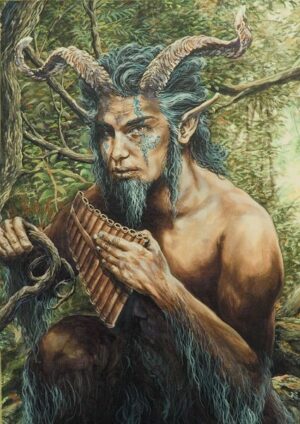
When you experience sexual desire, childlike wonder, or genuine happiness, Pan is there to help you celebrate. In the sights of any romantic or in the beating heart of anyone who accepts life as it is, flaws and all. The magical energies of Pan are those of ecstasy, oneness with nature, joy, sexuality, and stability.
Therefore, Pan teaches us to enjoy life and love to the fullest, to access that wildest part of the self. On a literal level, the Greek god Pan can teach you how to connect with nature, but on a metaphorical level (and the two often go together), Pan shows you how to find the wildness within, even if the journey may be frightening.
As one of the “old gods,” working with Pan is no walk in the park. He will show you the darkest parts of yourself, analogous to the inner forest where no light shines, but he will also show you the intrinsic beauty and power in those parts.
My Experience Working With Pan
Pan is joyful, naughty, generous, sensual, emotionally intelligent, and wise. He can be lighthearted and still be worthy of the highest regard.
For the first few days of our working together, he was quite present in my life, with symbols and signs showing up everywhere. In a manner I never had before, I felt truly alive. All of my senses seemed to sharpen so that I could take in more of the world’s splendor and delight. To be honest, I could spend hours in my living room just staring at the many hues. The experience is very similar to working with psychedelics.
Although he is most known as a deity of procreation, he also represents all forms of sensual enjoyment, and I definitely learned these lessons through Pan. His energy is quite pagan sexually, which allowed me to connect with that deepest, most primal part of myself and express that piece with my partner.

After this period of time had passed, I became more interested in studying and retelling Greek mythology. I think he saw in me the desire to tell stories, as hearing one has always been one of my greatest pleasures. When I ask him a question, he invariably asks me to tell him a tale. Additionally, I picked up on the fact that Pan highly endorses individualism.
Sensuality and enjoyment are central to Pan’s philosophy. In his honor, you can hold a dance, a concert, a parade, a feast, or any other celebration you can think of. I’ve learned how to truly enjoy something (instead of always worrying about how I look or feel) and to let out that darkest part of myself.
Ultimately, I find it extremely rewarding to work with the old gods, and Pan is no exception. I find that these old gods encompass the most primal nature of the self. While this work can be scary because it changes your entire perception of the world around you, it’s also infinitely rewarding, and Pan can provide the gateway into this kind of inner work.



